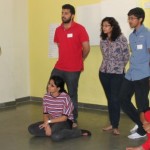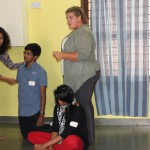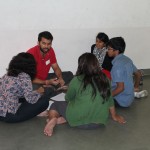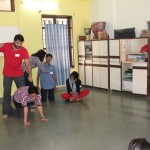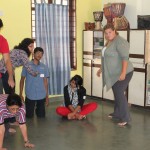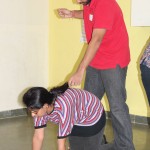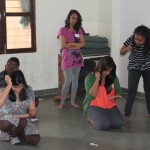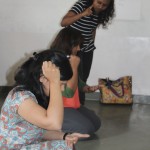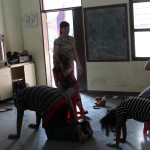GETIndia 2014’s partner, Teach for India (TFI), asks it’s second year teaching fellows to identify a problem in their classroom and execute a plan to solve it. Sneha Ram, Mohini Bishnoi, and Nithya Ramachandran (all second year fellows) decided that there was plenty of drama that took place in their classrooms, but not the drama they were looking for. With over 50 students per classroom they thought, “There must be another way to engage them and get them excited about learning.” So the three of them agreed, the problem they would try to solve was the lack of theatre in their classrooms as a way to enhance their lessons and classroom culture. They called their project, Limelight, hoping to let each of their students experience the confidence of being in the limelight’s glow. And now, in partnership with GETheatre they are learning to implement their ideas and facilitate drama in their classrooms.
Yesterday, GETheatre teaching artists, Ashley Olson and Lindsey Samples, met with 10 of TFI’s fellows in Pune who have been looking for new tools to help them enhance the learning in their classrooms and provide them with creative ways to connect to students. Many of these teachers described the odds that are stacked against them. Each conducts a class alone that has upwards of 50 – 60 students; making our own US classrooms of 30 plus students seem like a walk in the park. Many students experience challenging home lives; faced with limited resources stretched thin amongst many family members, frequent abuse, and little support from their families in the pursuit of an education.
Over the course of the day Ashley and Lindsey not only led an exploration of the methods of incorporating drama into the classroom and across the curriculum, but also provided these young teachers with an opportunity to examine the problems they face in the classroom in a creative and transformational way. Check out the images depicting their work using image theatre define and engage with these issues:
- Ashley helping a group of teachers shape their image (tableau).
- Teachers looks a gender difference in society & in the classroom.
- Still image (tableau) depicting students struggling through a learning disability.
- Lindsey leading the teachers through dramatizing an experience in the classroom (simultaneous dramaturgy).
Reflections on the workshop:
Amazing, amazing.
– Thanks for giving me the idea for practice stage presence with my toddlers.
– All the activities we did can be a part of our literacy sessions making learning fun.
Thank you and welcome to India!
-Manvi
~~~
The workshop has been a great start to this New Year. I feel energized about
entering class now with lots of new ideas! Thank you.
Radhika
~~~
Take aways:
-Define what participation looks like for different students.
– Some great ideas to assess mastery of a particular content area informally.
~~~
A much needed guidance in order to keep my class focused apart from academics. It
was a really good session but I’m a bit nervous and bit confident how it would turn
up in class as I deal with 55 kids. Thank you for coming and giving your guidance.
Murali
~~~
Things I loved:
– Your energy and readiness to tailor the workshop worked well for us.
It catered to divers groups of ages and was cognizant of our needs. The
philosophy of your pedagogy . . .Â
– My longstanding question is how do you create a practice of including these
activities and making them part of every lesson you teach. How does one
sustain this process?
Sneha
~~~
Dear Ashley & Lindsay,
It was a lovely workshop. I am so glad I woke myself on a Sunday morning and
attended this. I am taking away a lot from today’s session. I absolutely love how
we reflected and discussed stuff about the activities right after the activities.
I am definitely going to try all this with my class and kids. Thanks again.
Love,
R
~~~
Dear Ashley & Lindsay here are my reflection on the workshop:
– Loved the pace, you gave us time to reflect.
– Loved the fact that it wasn’t a rigid structure but felt organized.
– Your attention to the feedback loop and the way you innovated and made
adjustments over the break.
– Your experience and commitment just shines through.
Thank you for doing this!
Love,
Mohini
